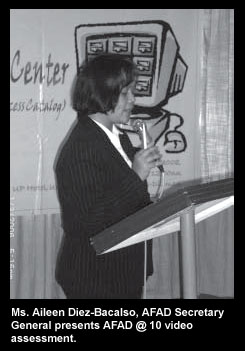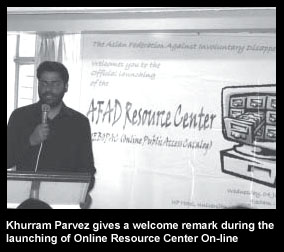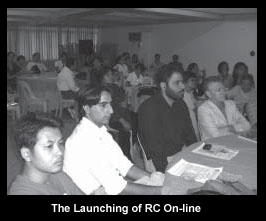The Asian Federation Against Involuntary Disappearances
(AFAD) officially joined the information superhighway on 4 June 2008 when
it launched the Resource Center WEBOPAC at the University of the
Philippines Hotel. The launching was held on the occasion of AFADís 10th
anniversary.
 The
creation of the WEBOPAC was a fruit of AFADís sustained efforts to uphold
peopleís right to information. Especially in the case of enforced
disappearances where information is vital1, AFAD wanted to extend its
reach to more people around the globe.
The
creation of the WEBOPAC was a fruit of AFADís sustained efforts to uphold
peopleís right to information. Especially in the case of enforced
disappearances where information is vital1, AFAD wanted to extend its
reach to more people around the globe.
When the Resource Center (RC) was opened two years ago
in honor of Munir and Aasia Jeelani, it started collecting human rights
literature. It also set up a database of disappeared persons from the
Philippines, Thailand, Indonesia, Kashmir, Sri Lanka, Nepal and Belarus.
At present, it continues to expand this database to put on record every
disappeared person. As the RC becomes just one click away in cyberspace,
families of the disappeared and other users can access relevant
information easily and quickly. AFAD hopes that in overcoming geographical
boundaries, more people will be empowered to end their silent suffering
and demand for truth, justice and redress from their governments.
RC utilizes the LIBRO/Iconium System. It is an
alternative library information system developed by Romeo Sebastian, a
Filipino librarian from Miriam College, Quezon City. This particular
software works by integrating all the bibliographic
 information
of all the available materials at the center (books, audiovisual
materials, posters, newspaper clippings, pamphlets, etc.) into a single
interface. This program is one of the most dynamic, comprehensive and
user-friendly systems used to manage information centers, libraries and
data banks in the Philippines today.
information
of all the available materials at the center (books, audiovisual
materials, posters, newspaper clippings, pamphlets, etc.) into a single
interface. This program is one of the most dynamic, comprehensive and
user-friendly systems used to manage information centers, libraries and
data banks in the Philippines today.
One feature of LIBRO is the Online Public Access
Catalogue (OPAC) which automates information retrieval. It offers
adaptable online searching capabilities which make it easier for every
person to locate the materials one needs. In addition, this particular
feature is the link that made RCís wealth of information accessible to
everyone in the World Wide Web.
The RC WEBOPAC was launched in conjunction with AFADís
10th anniversary. The event was graced by the distinguished H.E. Rubens
Fedele of the Italian Embassy and other members of the diplomatic
community such as representatives from the Swiss and Indonesian embassies.
 Members
of various human rights organizations also Candy May T. Nabaunag
Previously working as an academic librarian for major universities in
Baguio City. Candy opted to extend her horizons and shifted to NGO work.
Her knowledge of the llibrary profession is now fully realized through
herstewardship of the AFAD Resource Center.
Members
of various human rights organizations also Candy May T. Nabaunag
Previously working as an academic librarian for major universities in
Baguio City. Candy opted to extend her horizons and shifted to NGO work.
Her knowledge of the llibrary profession is now fully realized through
herstewardship of the AFAD Resource Center.
The Launching of RC On-line attended along with the
representatives of AFADís member- organizations who were present to
commemorate AFADís 10th anniversary.
With the continued efforts to expand and improve the
services of the Resource Center, AFAD impresses upon everyone that the RC
is not merely an aid to the Federationís own programs but that it has
significant contribution to the field of human rights; more particularly
to the global fight to end enforced disappearances.
______________________
(Endnotes)
1 The right to information is guaranteed in Article 18 of the UN
Convention for the Protection of All Persons from Enforced Disappearances.
This provision states that every person with a legitimate interest should
have access to basic information such as the date, time and place of the
deprivation of liberty and the whereabouts of the person. Restrictions to
such information are only permitted when a person is under judicial
control and the restriction does not lead to an enforced disappearance.